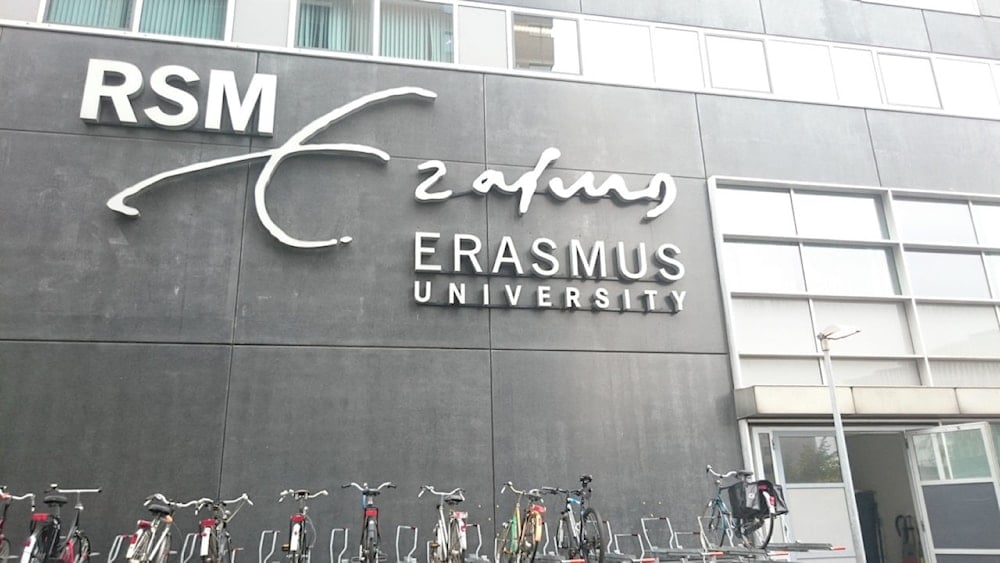European Universities sever ties with Israeli institutions over Gaza
Two major European universities, Geneva and Erasmus Rotterdam, have cut academic ties with multiple Israeli institutions, citing credible links to human rights violations and international law breaches amid the ongoing war on Gaza.
-

This photo shows the façade of one of Erasmus University Rotterdam's buildings. (Erasmus Magazine)
Two leading European universities have taken decisive steps to suspend or terminate academic cooperation with Israeli institutions, citing serious concerns over human rights violations amid "Israel's" ongoing war on Gaza.
The University of Geneva announced that it will end its strategic partnership with the Hebrew University of Jerusalem and will not renew its student exchange program with Tel Aviv University, set to expire in 2026.
The decision followed recommendations from the university's scientific committee and was motivated by what the university described as "outrage at the humanitarian situation in Gaza." In its statement, the university urged all parties, especially the Israeli government, to uphold international humanitarian law and human rights standards.
In the Netherlands, Erasmus University Rotterdam (EUR) has taken similar action, freezing all cooperation with Bar-Ilan University, Hebrew University of Jerusalem, and the University of Haifa.
The move came after an internal review by EUR's Advisory Committee on Sensitive Collaborations (ACSC), which found credible indications that the Israeli institutions in question are systematically involved in violations of international law, primarily due to their ties with the Israeli military and their roles in the occupied Palestinian territories.
Ethical break expands
As part of the freeze, EUR will suspend all active student exchange programs with the affected institutions and will not initiate any new research collaborations. The university underscored that although academic freedom is a core value, it does not override the need to act when there is a "reasonable suspicion of serious violations of fundamental rights."
University officials stated that any potential future collaboration will depend on whether the Israeli institutions can demonstrate a clear separation from activities or partnerships that contribute to human rights abuses.
Read more: Israeli academia facing 'explicit' boycotts by foreign universities
These moves are part of a broader trend. Across Europe and beyond, several universities have begun reassessing their ties with Israeli academic institutions:
- Trinity College Dublin terminated all institutional links with Israeli universities and companies, including divestment measures and student exchange cancellations.
- In the Netherlands, the University of Amsterdam, Tilburg University, and Radboud University suspended or ended collaborations with Israeli universities.
- Ghent University in Belgium has also cut academic ties, citing connections between Israeli universities and state military infrastructure.
- The University of Helsinki suspended exchange programs with Israeli institutions, expressing concern over the humanitarian crisis in Gaza.
Outside Europe, similar actions have taken root:
- In Canada, the University of Toronto Faculty Association voted to support divestment from entities tied to Israeli military actions.
- In the United States, faculty and student protests have intensified at several institutions, with some pushing for divestment and severing academic ties.
- In Australia, disciplinary actions have been taken against pro-Palestine student activists, underscoring the global reach of campus tensions surrounding the Gaza war.

 3 Min Read
3 Min Read









